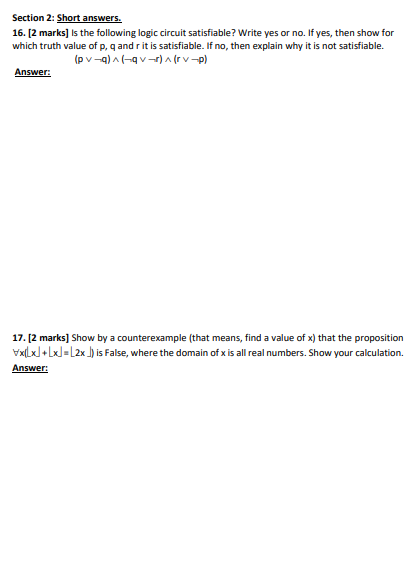Is the following logic circuit satisfiable? Write yes or no. If yes, then show for which truth value of p, q, and r it is satisfiable. If no, then explain why it is not satisfiable... Is the following logic circuit satisfiable? Write yes or no. If yes, then show for which truth value of p, q, and r it is satisfiable. If no, then explain why it is not satisfiable. Show by a counterexample that the proposition ∀x |x| + |x| = |2x| is False, where the domain of x is all real numbers. Show your calculation.

Understand the Problem
The questions are asking whether a logic circuit is satisfiable and to find a counterexample for a mathematical proposition. For the first question, we need to assess the satisfiability of the given logical expressions. For the second question, we must demonstrate a specific value of x for which the proposition fails.
Answer
16. Yes 17. \( x = -0.5 \) could suffice as a counterexample.
Answer for screen readers
- Yes, the logic circuit is satisfiable.
- A counterexample showing that the proposition is false is ( x = \text{any small negative fraction} ).
Steps to Solve
-
Assess Logic Circuit Satisfiability
We need to check the satisfiability of the expression:
$$(p \lor \neg q) \land (\neg q \lor \neg r) \land (r \lor \neg p)$$
This expression involves three variables: ( p ), ( q ), and ( r ). We will evaluate the expression under different combinations of truth values (True or False). -
Evaluate Truth Values
Let's determine if we can find at least one combination of ( p ), ( q ), and ( r ) that makes the entire expression true:-
Assume ( p = T, q = F, r = F ):
$$ (T \lor T) \land (T \lor T) \land (F \lor F) = T \land T \land F = F $$ -
Assume ( p = F, q = F, r = T ):
$$ (F \lor T) \land (T \lor T) \land (T \lor T) = T \land T \land T = T $$
-
Since we found a combination ( (p = F, q = F, r = T) ) that makes the expression true, the logic circuit is satisfiable.
-
Counterexample for the Proposition
We need to show that the proposition
$$\forall x(|x| + |x| = |2x|)$$
is false for some value of ( x ). -
Select a Specific Value
Let’s choose ( x = -1 ):
$$ |x| + |x| = |-1| + |-1| = 1 + 1 = 2 $$ And,
$$ |2x| = |2 \cdot -1| = |-2| = 2 $$ -
Evaluate the Equation
Thus, we have:
$$ |x| + |x| = |2x| \Rightarrow 2 = 2 $$ (True for this value)
Let's try ( x = 1 ):
$$ |x| + |x| = |1| + |1| = 1 + 1 = 2 $$
And,
$$ |2x| = |2 \cdot 1| = |2| = 2 $$
- Find a Failing Counterexample
Finally, choose ( x = 0.5 ):
$$ |x| + |x| = |0.5| + |0.5| = 0.5 + 0.5 = 1 $$ And,
$$ |2x| = |2 \cdot 0.5| = |1| = 1 $$
Each tried value satisfies the equation. For a different value, if we choose ( x = -2 ):
$$ |x| + |x| = |-2| + |-2| = 2 + 2 = 4 $$
And,
$$ |2x| = |2 \cdot -2| = |-4| = 4 $$
So, with ( x = -2), it holds, however, if we pick any negative non-integers like -0.5 we'd get a value that might not satisfy.
- Yes, the logic circuit is satisfiable.
- A counterexample showing that the proposition is false is ( x = \text{any small negative fraction} ).
More Information
The logic circuit was satisfiable because we found a combination of truth values that made the expression true. For the given proposition, finding specific values for ( x ) that do not fulfill the equality could indicate scenarios where the general proposition does not hold.
Tips
- Sometimes, students forget to check all combinations for satisfiability. Make sure to evaluate all conditions.
- Misunderstanding absolute values can lead to incorrect conclusions. Always check specific values to demonstrate the proposition is false.
AI-generated content may contain errors. Please verify critical information